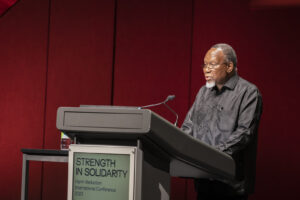Source of featured image: Harm Reduction International
It’s not often I come away from a work event feeling a mix of emotions, while continuing to ask why? Upon the conclusion of Harm Reduction International’s conference in Melbourne, I felt exhausted, overwhelmed, angered and sad. But more so, I was inspired by the passion, empathy, hope, and belief that was evident over the four days.
This conference brought over 1000 delegates from all corners of the world, all harm reductionists, all wanting to fight for the right for health and uphold the rights of every human being. Those were just some of the remarks made by Helen Clark, Former Prime Minister of New Zealand, and Chair of the Global Commission on Drug Policy. Ms Clark added that we are still confronted by an international war on people who use drugs by current drugs laws and policies. Ms Clark went on to say that six decades of this approach has shown its utter failure, none more so than the fact thirty-five countries across the world still apply the death penalty for drug offences. The most recent case of Tangaraju Suppiah, convicted of coordinating the trafficking of one kilogram of cannabis, was hanged on 26th April, showing the disproportion and brutality of such laws. This has been the twelfth killing via the death penalty, for drug offences, in Singapore, in the last 13 months. The reality of such punishments was brought home by Ajeng Larasati from Harm Reduction International, who read the letter from Jeff, a victim of the war on drugs, written shortly before they were executed for a drug offence. We must stop criminalising people who make choices for themselves. Every country, including Wales, must not stay silent when the rights and dignity of others are affected and abused. Silence is violence. Silence is complicity.

Helen Clark, Former Prime Minister of New Zealand and Chair of the Global Commission on Drug Policy. Image source: Harm Reduction International
What was evident throughout the four days of the conference was the continuing impact of the barbaric acts of colonialisation, just a few hundred years ago, upon society and drug policy. This was primarily made evident by the acknowledgement made by every speaker at the start of their presentation: “I acknowledge that where we meet today is on the lands of the five tribes of the Kulin Nation and I wish to acknowledge them as Traditional Owners. I would also like to pay my respects to their Elders, past and present, and Aboriginal Elders of other communities who may be here today”. James Ward, Director of the Poche Centre for Indigenous Health at The University of Queensland stated, “The western society approach to harm reduction has failed to alleviate effectively enough, nor quickly enough, the disease and effect on my people, and many other Indigenous peoples around the globe … Decolonise, decolonise, decolonise harm reduction”. It can be strongly argued that colonialism and racism provided the footing for current drug laws and policies and plays a significant part in the disproportionate and discriminatory implementation of such. Whether it be Indigenous communities in Australia, the Māori population in New Zealand, First Nation people in Canada or Black and Minority Ethnic communities in the UK, they all make up the minority of their respective countries’ populations, but account for most drug offences. Here in the UK, black people are stopped and searched for drugs at nine times the rate of white people, and as highlighted by Andre Gomes from Release, black children are six times more likely to be searched in schools for drugs. Yet white people report using drugs at twice the rate of that of black people.
So, what next? How do we halt and eradicate the role of colonialism within drug policy? Paul Hunt, New Zealand’s Chief Human Rights Commissioner, remarked during the closing ceremony, “The most effective form of indigenous harm reduction is decolonisation” and that systems and cultures of oppression, from racism, stigma, capitalism, and the patriarchy, need to be dismantled and abolished. If we don’t, these social injustices will forever rear their heads and continue the harm and damage that we see across the world today. Therefore, more effective policies, such as decriminalisation or legalisation of drugs, to name just a few, need to be implemented, while ensuring those who are most affected and discriminated against by the war on drugs, are the one’s that benefit the most from reform. Unfortunately, this has not been in the case in Canada upon the implementation of their regulated cannabis market, as white males continue to be the beneficiaries, while black and indigenous communities continue to be left behind.
There is still much to be done within national and global drug policy, most notably highlighted by Ann Fordham from the International Drug Policy Consortium (IDPC). Ann shared the findings from IDPC’s unique Global Drug Policy Index, which documents, measures and compares national-level drug policies. The UK sits fourth on that list, surprisingly, above countries that have implemented policies from regulated drug markets and facilities such as drug consumption rooms. Yet this is not necessarily something to be proud of, from a UK perspective, as there is significant room for improvement.

Rob Barker (far right) sharing Barod’s findings regarding the implementation of digital interventions in Wales. Image source: Harm Reduction International
However, the work of people within harm reduction really stood out and stole the show over the four days. During the opening ceremony, various awards were presented, most notably to organisations that continued to deliver pivotal services in Ukraine, since the invasion of Russia. What is worth noting too, is since this awful act, Needle and Syringe Programs have been implemented within prison settings, in Ukraine. Even this is not something in operation in the UK. To say such harm reductionists have shone through in the face of adversity, is an understatement. On the note of prisons, it was also highlighted by Peter Davidson, that the implementation of naloxone vending machines has proved a significant success in prisons in Los Angeles. Over thirty-thousand kits every year have been dispensed to those being released from jail, via this low threshold mechanism. And done so in a confidential and sensitive manner. Yet many are still reluctant to take a kit upon-release, as, if they are to use it and save someone’s life, the police may act discriminately towards them following such incidents, by investigating them for potential drug offences. A prime example of stigma playing a significant role in the operation of drug policy.
While I could continue for another page or two, outlining the incredible work that was shared and displayed during the conference, there was simply too much on show for me to relay here. However, Barod received a fantastic response to our own poster that was displayed on the final day, highlighting the implementation of some of our regional and national digital interventions, including the Live Webchat Service, Naloxone Click and Deliver Service, and Dyfed Drug and Alcohol Services’ (DDAS) Spike on a Bike initiative. It is fair to say that Wales is not far behind, if not on par with, many of our counterparts on the world stage.
During the opening ceremony, Helen Clark set the tone for the conference, saying that “better access to harm reduction services could, and would, have saved countless lives” and that “inclusion, equity, and non-discrimination are fundamental to drug-related policies”. Such statements were reiterated at the close of the conference. Firstly, the Former President of South Africa, Kgalema Motlanthe stated that “the future is not a place we are going to, but a place we create” and that “harm reduction is a model for humanity”. Yet it was only right for the conference to be closed upon the words of Judy Chang, the Executive Director of the International Network of People who Use Drugs (INPUD), who noted that “the role as a drug user advocate should not only be limited to telling personal stories. There’s undeniable power in sharing our lived experiences & lessons learned. But we are also analytical and tactical, we are strategic advocates and brilliant service providers. People who use drugs are some of the best people I know”.
While thankfully some policies, such as the death penalty for drug offences are not implemented in Wales, it is safe to say that more can be done to fight exclusion and oppression, both within UK drug law and policy, and its subsequent operation. We can all play a part in the social justice movement around substance use, human rights and the end to stigma and oppression. We can campaign. We can educate. We can fight. We can demand. As history has dictated, change often come from the people and not by politicians.

Former President of South Africa Kgalema Motlanthe. Image source: Harm Reduction International
Rob Barker is the Campaigns and Communications Lead for Barod. Rob holds an MSc degree in Addictive Behaviours from the University of Liverpool and has worked in the substance use field, in Wales, for over twelve years. Rob has previously undertaken a Churchill Fellowship, researching the policies and processes of setting up a drug consumption room in Wales. Twitter: @RobBarkerW

